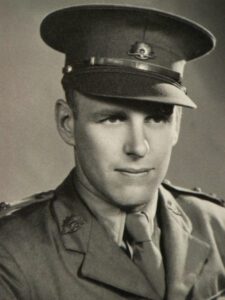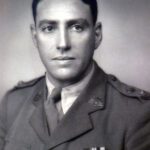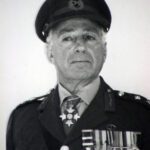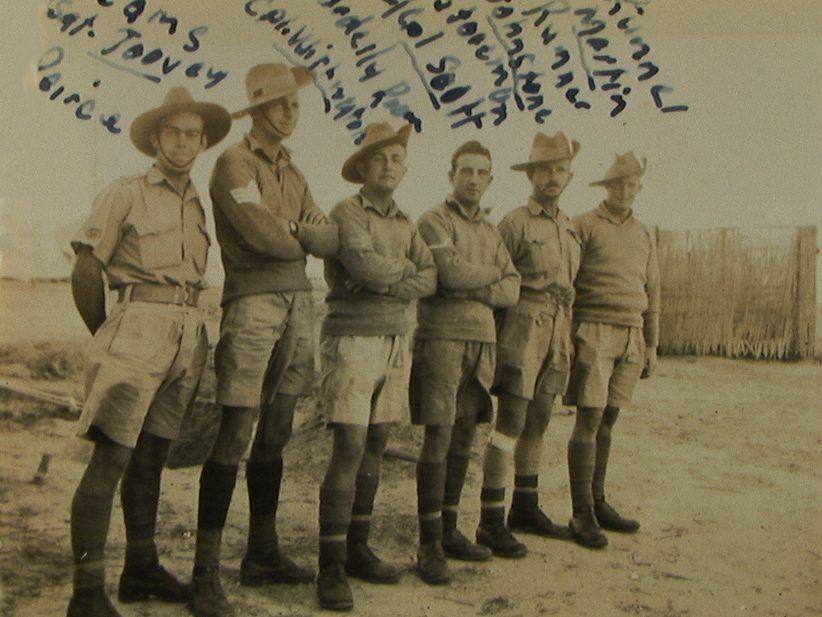Established at Victoria Barracks, Sydney, on October 16th, 1939, it was one of the initial infantry battalions raised under the all-volunteer force at the outbreak of the war. Led by Lieutenant Colonel Kenneth Eather, a strict disciplinarian who’s nickname was ’28 days’, as he often handed down the sentence of 28 days confinement to barracks, the most severe allowed. In typical Australian fashion this nickname evolved to ‘February’, because the month has 28 days! The battalion’s unit color patch featured black over green, reminiscent of the 1st Battalion’s colors from World War I, their motto was Primus agat Primas (First Always First). Basic training was in Ingleburn, New South Wales, which saw the unit develop its cohesion and esprit de corps. This is demonstrated well by an incident involving the camp canteen, which was run by a civilian contractor who was known for high prices and low quality, and answering any complaint with abuse. The canteen caught fire and the Orderly Officer (OO) announced ‘I’ll get the fire picquet’. The Commanding Officer (CO) replied ‘You’ve had a long day Griffiths. Finish your meal’. When the OO went to raise the alarm several minutes later the CO insisted ‘Have your coffee first. It’s still not thoroughly alight.’ A few minutes later the CO announced ‘It can’t possibly be saved now’. And the problems with the canteen were resolved!
The 2/1st Battalion embarked for overseas service on January 10th, 1940, aboard the SS Orford. The hospitality on board was very well regarded, the Sergeants Mess serving Roast Leg of Pork, Beef Ribs and very cheap beer! Deployed to the Middle East, the battalion arrived in Egypt on February 13th, 1940. Subsequently, it moved to Palestine, concentrating with the 16th Brigade at Julis near Gaza. The brigade stayed in Palestine until August, moving to Egypt for active service preparations with the 6th Division. The 2/1st’s first campaign involved the advance from Egypt into eastern Libya in January and February 1941. Notably, on January 3rd, 1941, it participated in the first Australian ground action of the war, leading the attack to capture Bardia. Later in the month, the battalion was at the forefront during the assault on the Italian-held port of Tobruk. After the capture of Tobruk, the 2/1st garrisoned the city before leaving for Greece in March 1941 due to concerns about a German invasion.
The battalion faced the Germans at Veria in Northern Greece, before withdrawing to the south. B company saw action at the Battle of Pinios Gorge, the remainder of the battalion were exhausted from serious mountaineering the days before, managing several steep ascents and descents over a few days in a bid to outmanoeuvre German mountaineer regiments. They were in Larisa during the battle of Pinios Gorge recovering in an abandoned industrial structure. The Battalion saw further action in Greece prior to their evacuation on 25th April.
Instead of returning to Egypt, the battalion was redirected to Crete, where it defended the town of Rethimno from German paratroopers, holding them off for over a week. Most of the 2/1st Battalion was subsequently captured on Crete, but the unit was later re-built from survivors in Palestine.
The decision to re-form the battalion involved transferring 200 experienced men from the 16th Brigade’s other two battalions, the 2/2nd and 2/3rd, and bringing in 500 newly arrived reinforcements. By October 1941, the re-formed 2/1st was allocated to garrison duties in northern Syria, captured from the Vichy French during the earlier Syria–Lebanon Campaign. Following Japan’s entry into the war in December 1941, the 2/1st Battalion embarked for home in March 1942, with a diversion to Ceylon to defend against a potential Japanese invasion. Finally arriving in Melbourne on August 7th, 1942, the battalion’s activities shifted towards the Pacific theater.
In September 1942, the 2/1st deployed to New Guinea, marking the beginning of its involvement in the Kokoda Track campaign. The battalion played a significant role in the Allied pursuit of withdrawing Japanese forces, participating in major battles at Eora Creek, Gorari, and Sanananda between October and late November 1942. The Kokoda campaign took a toll on the 2/1st, with over 60 percent of the battalion becoming casualties, either killed, wounded, or sick.
After a brief period of respite and rebuilding in Australia, the 2/1st returned to New Guinea in December 1944, fighting in the Aitape–Wewak campaign. The battalion joined the coastal advance towards the main Japanese base at Wewak, contributing to the efforts to round up an estimated 35,000 Japanese. Finally, in December 1945, the 2/1st Battalion was disbanded, concluding its significant contributions during World War II.
Throughout the war, 3,491 men served in the battalion, with 263 killed and 418 wounded. The unit’s soldiers received many decorations, including three Distinguished Service Orders, one with Bar, 15 Military Crosses, seven Distinguished Conduct Medals, 28 Military Medals, and 68 Mentions in Despatches.
The men of the 2/1st Australian Infantry Battalion
Captain William Travers

You just hope you didn’t get hit. But you didn’t think about that. You just had to do the job and do the job. That’s what you did.
Captain William Travers, commanding officer of C Company, 2/1st Battalion
William Travers served as the commanding officer of C Company, 2/1st Battalion during the fighting in Greece and Crete. Prior to the war he had been a Lieutenant in the militia, while working as a salesman. He married Jean Mackay, daughter of Lieutenant General Sir Iven Mackay, shortly before deploying to the Middle East in December 1939.
William described the defensive preparations at Rethimno, ‘The 2/1st Battalion was on the eastern end of the airport, and the eastern end of the airport had the high ground, which covered the airport. The companies were spread around, each with its own field of fire. C Company was near the eastern end of the airport, just at the foot of the high ground. On the high ground was the A Company. Well, the Germans landed on the high ground. Well they would, if you’re coming in to take something, you take the main feature. And that’s where all the fighting went on. We did have guns. We did have French two hundred millimetre guns, without sights, without gun sights, so they had to put them on top of the hill so that the gunners could look through the barrels and aim them. So we had those, and we had, I think, two hundred millimetre Italian guns, which weren’t all that hot anyway.
He then described the German air assault on his position at Rethimno, ‘You try to shoot a hundred yards, you don’t have to worry. You just shoot. Well, they’re eleven hundred blokes shooting out rifles, at about three, four shots a minute. There’s a fair amount of bullets going up in the air. We brought down six aircraft by small arms fire. Six German aircraft. As they came over, get over the airport, they jumped out of their planes. Well, of course, they come down as sitting duck shots. And the German commander who we eventually took prisoner said, ‘You shouldn’t have been shooting my men, they couldn’t shoot back at you.’
During the battle William was near the monastery at Rethimno when he ‘saw a Greek priest with a stove pipe hat on and a beard down to here, with a bandolier of ammunition and a gun in his hand, stalking off to shoot the Germans.’
William was captured at the end of the Battle of Rethimno and was a prisoner of war until February 1945.
After the war, William worked in a newspaper company and finished up as general manager of production and distribution, at Consolidated Press. He and Jean had two children, but their marriage ended in divorce shortly after the war, in 1948. This same year he married Kathleen Clayton, and they had two children, in addition to the two children Kathleen brought to the marriage.
Lieutenant Colonel Paul Cullen


Paul Cullen was a captain when he was appointed 2nd in command of a company during the Greek Campaign and subsequently served in command positions in Crete, Syria, and New Guinea. He started in the military in 1927 serving in the Garrison artillery militia and stayed until 1939 when he joined the AIF with the 2/2nd Battalion, 16th Brigade, 6th Division.
He was proud to claim, “that no division in the world has fought in three different continents against three different European armies in a period of six months. We fought against the Italians in North Africa and won; we fought against the Germans in Greece and Crete and lost, and we fought in Syria against the pro-German Vichy French and the French Foreign Legion and won.”
Paul Cullen’s last name was Cohen at the start of the war, but he changed his name after the campaign in Greece and Crete. “My brother was also in the RAAF,” Paul recalled, “but I decided that, if we were going to be taken prisoner by the Nazis, Cohen wasn’t the best name to have, so we changed our name to Cullen. And we’ve had that name ever since. And I changed my name in Palestine.”
One of the lessons he gave in 2003 was titled: “The Greek Campaign: Strategic Victory and Tactical Defeat.” “I don’t think we were let down at all; I think I gave a talk the other day about the campaign in Greece, and it was one of Churchill’s most brilliant arrangements.” In his understanding, the campaign was very successful in delaying the German advance towards Russia so it would start six weeks closer to winter.
On the tactical level, however, things were less clear-cut. Paul quoted Harry King, a man from his platoon, who said that the lessons they learned from fighting the Germans in Greece and Crete could be boiled down to this: “we only had 303s, and the Germans had submachine guns; it’s like fighting someone with boxing gloves, and he’s not got any.”
Paul explained, “when we went to Greece and met the Germans, we won our only battle there and what we had to do in the 2/2nd Battalion was to occupy a position, to deny the Germans.” This is known today as the Battle of Tempe Gorge, also known as the Battle of Pinios Gorge. His battalion was supposed to cut access to the main road from Northern Greece through a town called Larisa.
Paul described how “[The Commander] of the 21st New Zealand Battalion, and at dawn, abandoned his position overlooking the wrecked bridge over the Pinios Gorge and gave the order, every man for himself. He was subsequently court-martialled. But as a result of that, his battalion turned tail and ran, and there was this extraordinary situation, we were left like shags on a rock in a reserve position, but he just, between us and the Pinios Gorge, just disappeared. And it was an impossible situation, however.” Paul recalled that some New Zealanders did stop to help, and he made sure they were commended for their fortitude after the battle. Soon, however, German armoured units filled the gap left by the battalion that fled.
“Boys anti-tank rifle, which was two meters long and… was very effective against the tissue paper Italian tanks, you see, but against these wonderful Mark Four German tanks, you were nothing. Like throwing a paper pellet.”
Some of the tanks were taken out of action by artillery fire, but the rest pressed forward. “A couple came along, and one of them paid me the compliment of firing a burst of machine gun fire at me, and some other men, we were facing north, they came from the west, and a bullet went through my tunic pocket, and clipped the lucky sovereign my mother had given me.” These same tanks killed several men around Paul, and he remembered soldiers from other units shooting their revolvers in the hope of diverting their attention. He believed it would have been the end for the entire ANZAC Corps if the tanks persisted, but due to the low visibility, they did not understand how close they were to the main road.
Paul recalled how at the time many soldiers were disappointed about the absence of the RAF, not knowing that it had depleted its forces and had no more help to send. He may have witnessed his cousin Nigel Cullen in action as a RAF fighter pilot over Greece. Nigel Cullin was an ace credited with 16 victories, who was based in Greece flying Hawker Hurricanes when he was killed in a dogfight against Italian aircraft over Albania in March 1941.
After the tanks, German lorried infantry came. Paul described them as well-organized and disciplined. Paul’s duty was to hold the pass until the British 1st Armoured Division showed up, and he vividly remembered the moment: “down the road came three vehicles, you see, one armoured car, and one truck and one car, so I stopped them and said, ‘Who are you?’ He said, ‘We’re all that remains of the 1st Armoured Division.’” At this point, the order to retreat was given.
In a hectic retreat that followed, Paul, now a major in command of 70 men, both Australians and New Zealanders had reached the Aegean coast. They rented a fishing trawler and travelled by night. For days they were island-hopping until they eventually reached Crete.
After rejoining the Australian forces, Paul was granted the command over some 500 men of the newly formed 16th and 17th composite Battalion. He was in charge of holding a line south to Sphakia, which was a little beach. He remembers his men being poorly provisioned and that they had no blankets during a rather chilly April. Although they suffered from air attacks, Paul’s units did not participate in the fighting, and by the time Germans approached, they were already ordered to evacuate the island. Paul remembered being the last person off the Sphakia beach.
Paul made it to the rank of lieutenant colonel, having participated in the North African desert campaign and the New Guinea campaign until the end of the war. He was decorated with the Companion of the Distinguished Service Order and bar. When the Citizen Military Forces were re-raised, he joined the reserves to eventually reach the rank of general. He founded several private companies, including the first property trust with LJ Hooker Limited. At the time of the interview in 2003, he had two children, eight grandchildren, and 16 great-grandchildren.
Lieutenant Donald “Don” Peirce



Donald Peirce was a sergeant in the 2/2nd Battalion in Greece in 1941, but had served in the 2/1st Battalion both before and after this. He was born in Wollongong in 1920 and attended Armidale High School with his brother. In 1936, he started working as a probationer for the Bank of New South Wales – a job he got not because of his brilliance, Don claimed, but because his dad was in the bank in a senior position. Don’s father was a Great War veteran before he was a banker but never told his sons much about the war.
It was at this time that he joined the militia at Coffs Harbour 13th Battalion, the 13th Platoon, Byron Scottish Regiment. It was also here that he met his future wife May. Three years later Don was in his militia camp when the war was declared: “We were all paraded and told that Australia was at war and all those intending to serve take one pace forward, on the command, take one pace forward. And he gave the command, and everyone took one pace forward… Why did I join up? I don’t know whether it was for a little bit of experience, excitement plus a bit of loyalty, mix it all up and you most probably have the reason.”
From the militia, Don and his mates joined the Australian Imperial Force (AIF) and went away for training in November 1939. Don remembers how he became a sergeant despite being under the age of 21: “‘If you wanna be an NCO (Non-Commissioned Officer), take a pace forward.’ And Harry turned round to me and he said, “There’s money in it, come on,” so we both took a pace forward. And that’s absolutely how I became an acting sergeant and then a sergeant.“
After a parade in Sydney, Don and his battalion sailed out onboard the Otranto, on 10th January 1941. In February, they arrived at camp Julis in Palestine where training continued for over six months. What they learned in training they implemented for the first time in the Battle of Bardia, where Don has seen combat and felt the burden of leadership under fire.
At Tobruk, his platoon had used six-inch Howitzers, despite never been trained for it, and were quite satisfied with their performance. Don remembered that for him, the fighting part was easy compared to what came afterward. He did not lose any people from his platoon but did lose some mates from his hometown. However, for him, even burying enemy soldiers was a sad ordeal: “Oh, Jesus dear, once they’re dead they’re dead. They’re, I mean might as well be your brother, it doesn’t matter two hoots. They didn’t fight because they don’t like you, they fought because it was a bloody war and they had to. Oh, the Germans were the same, they had to do their job, this thing, otherwise Hitler woulda shot em in the back even. But on no, I never felt that way about any of em, any of em.”
2/2 Battalion was pulled from Tobruk and sent to Greece while the country was still neutral. Don remembered seeing the German ambassador to Greece writing down numbers as ANZAC forces while they were disembarking. Not long after, he remembered being about only ten and eleven miles from Salonika, on the slopes of steep snowy hills waiting for the German attack.
Although his entire battalion was there during the fighting, he was only aware of his platoon, he vividly remembered German air superiority and devastating Stuka attacks. Eventually, ANZAC troops had to pull back and Don’s platoon arrived late for evacuation, only to see a few allied ships sitting at the bottom of the shallow harbour.
Resolved not to get caught by the encroaching Germans, Don and his mates fled north. Eventually, they met two Greek soldiers who had fought against the Italians in Albania and now wanted to join British troops in Egypt. They proved useful allies, and knowing the language they eventually managed to secure a little boat and some supplies. Don remembers Alonissos and Skiros islands among the many they hopped across before they reached Turkey. Turkey was neutral at the time, and Don described them as good hosts.
While fighting was taking place in Crete, Don was making way for Palestine. After he managed to rejoin the AIF, he was selected for officer training. In Palestine, he helped train the new mixed Jewish/Arab police force. It was here that he received the sad news of the death of his brother who had served in the air force.
Of his experience in Greece, Don remembered: “we always cursed Mr. Churchill for that, that wonderful man, but we cursed him because he used all the dominion troops to go to Greece knowing we could never win.” However, he described that later he realised the point of it and that he feels ANZAC troops did a good job making the German attack on the Soviet Union less potent.
He finished the war as a lieutenant and got married to May, who had written him letters throughout the war. They were married for almost 60 years.
Podcasts about Australians in the Mediterranean during WWII
Did my Relative Serve in these Battles?
Hundreds of thousands of Australians served in the Mediterranean during the Second World War. Some families know what their relative experienced during this often very important part of their life, but many do not. If you have a relative who served in the Australian armed forces during WWII and would like to know if they served in the Mediterranean please fill in the form below.
History Guild volunteers will research your relative’s service history and let you know what they find. As this is a free service provided by volunteers the timeframe may vary.
The text of this article was commissioned by History Guild as part of our work to improve historical literacy. If you would like to reproduce it please get in touch via this form.
